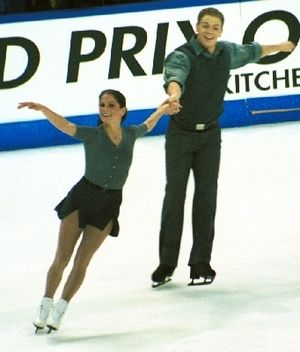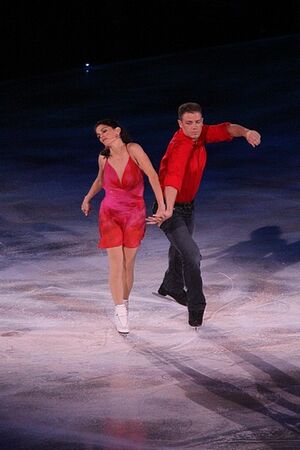Jamie Salé facts for kids
Quick facts for kids Jamie Salé |
|
|---|---|

Salé and Pelletier compete at the 2002 Grand Prix Final
|
|
| Personal information | |
| Country represented | |
| Born | April 21, 1977 Calgary, Alberta |
| Residence | Edmonton, Alberta |
| Height | 1.55 m |
| Partner | David Pelletier |
| Former partner | Jason Turner |
| Former coach | Jan Ullmark Richard Gauthier |
| Former choreographer | Lori Nichol |
| Skating club | CPA St-Leonard |
| Retired | 2002 |
Jamie Rae Salé (born April 21, 1977) is a Canadian former competitive pair skater. She is famous for winning the 2002 Olympic gold medal and the 2001 World Championship title with her former skating partner, David Pelletier. Their Olympic gold medals were shared with the Russian pair Elena Berezhnaya and Anton Sikharulidze after a special decision at the 2002 Winter Olympics.
Contents
Growing Up
Jamie Salé was born in Calgary, Alberta, Canada. She grew up in Red Deer. Her parents divorced when she was young.
Skating Journey
Starting Out in Skating
Jamie Salé first competed as a singles skater. She won a bronze medal at the Canadian Championships as a novice. In 1994, she won a bronze medal in pairs with her partner, Jason Turner. They even went to the Lillehammer Olympics and placed 12th. After the 1994 World Championships, their partnership ended.
Salé then went back to singles skating. She placed fifth at the 1995 Canadian Championships. She faced some injuries and later placed sixth in 1998.
Finding a New Partner
In 1998, Jamie Salé decided to try pairs skating again. Coach Richard Gaulthier suggested she try out with David Pelletier. They met in Edmonton in February 1998. They felt a great connection right away. Salé soon moved to Montréal to train with Pelletier.
Their first competition together was Skate Canada. They won a bronze medal! This success led them to the NHK Trophy in Japan, where they won another bronze. They were expected to win the Canadian title, but finished second. Pelletier's back pain caused them to miss some big competitions.
Success with "Love Story"
In 1999, choreographer Lori Nichol helped them create new programs. Their long program was set to music from the movie Love Story. This program became very popular.
They won several competitions with this new program. At the 1999 Skate America, they beat the world champions. They also won the 2000 Canadian Figure Skating Championships in Calgary. They earned very high scores, including five perfect 6.0 marks for their performance. They also won gold at the Four Continents Championships in Japan.
At the 2000 World Championships in France, they placed fourth.
Becoming World Champions
For the 2000–01 season, Salé and Pelletier worked with Lori Nichol again. They won Skate America and Skate Canada. They also won the 2001 Canadian Championships.
They won the Four Continents Championships in Salt Lake City, which was important because it was the site of the upcoming 2002 Olympics. They even brought back their "Love Story" program to win the Grand Prix Final.
The 2001 World Championships were held in Vancouver. Salé and Pelletier were top favorites. They won the gold medal, becoming the first Canadian pair to win Worlds since 1993. They also won the Lou Marsh Trophy as Canada's best athletes in 2001.
The 2002 Olympic Games
Salé and Pelletier had a strong start to the 2001–02 season. They won Skate America and Skate Canada. They also won the Grand Prix Final in Kitchener, Ontario. This win was important because it showed they could beat their main rivals, Berezhnaya and Sikharulidze.
The pressure at the 2002 Winter Olympics in Salt Lake City was huge. Canada had not won a figure skating gold in many years. In the short program, Salé and Pelletier skated well but fell on their final pose. They placed second.
In the long program, Salé and Pelletier skated a clean performance. The Russian pair, Berezhnaya and Sikharulidze, had a small mistake. Many thought the Canadians had won. However, the judges' scores placed Salé and Pelletier second. This caused a big discussion.
The next day, a judge admitted she felt pressured to vote for the Russian team. This led to a major judging controversy. As a result, Salé and Pelletier were also awarded gold medals in a special ceremony later that week. They shared the gold with the Russian pair.
This controversy led to big changes in how figure skating is judged. A new system was put in place to make judging fairer.
After the Olympics
After the 2002 Olympics, Jamie Salé and David Pelletier became professional skaters. They toured North America with a show called Stars on Ice.
In 2008, Salé and Pelletier were added to the Skate Canada Hall of Fame. They also joined the Canadian Olympic Hall of Fame in 2009.
In October 2009, Salé competed on the first season of the CBC show Battle of the Blades. She teamed up with former hockey player Craig Simpson. They won the competition. She returned to the show in 2010 and later as a judge in 2013.
Personal Life
Jamie Salé and David Pelletier got engaged in 2004 and married in December 2005. Their son was born in September 2007. In 2010, they announced their divorce but continued to skate together professionally until 2012.
In June 2012, Salé married her Battle of the Blades partner, Craig Simpson. They have one daughter, born in July 2013. Salé is also a stepmother to Simpson's three children from his previous marriage. Salé and Simpson divorced in 2022.
Skating Achievements
Pairs Skating
Amateur Competitions
(with David Pelletier)
| Event | 1998–1999 | 1999–2000 | 2000–2001 | 2001–2002 |
|---|---|---|---|---|
| Winter Olympic Games | 1st | |||
| World Championships | 4th | 1st | ||
| Four Continents Championships | 1st | 1st | ||
| Grand Prix Final | 5th | 1st | 1st | |
| GP Skate America | 1st | 1st | 1st | |
| GP Skate Canada International | 3rd | 1st | 1st | |
| GP Nations Cup | 2nd | |||
| GP Trophée Lalique | 2nd | |||
| GP NHK Trophy | 3rd | |||
| Canadian Championships | 2nd | 1st | 1st | 1st |
| Canadian Open | 1st | |||
| Masters of Figure Skating | 4th |
(with Jason Turner)
| Event | 1991–1992 | 1992–1993 | 1993–1994 |
|---|---|---|---|
| Winter Olympic Games | 12th | ||
| World Championships | 16th | ||
| Skate America | 7th | ||
| NHK Trophy | 5th | ||
| Canadian Championships | 1st J. | 4th | 3rd |
- J = Junior level
Professional Competitions
(with Pelletier)
- 2003: World Team Challenge: 1st place (Team)
- 2003: Ice Wars: 2nd place (Team)
- 2002: Hallmark Skaters' Championship: 1st place
- 2002: Sears Canadian Open: 1st place
Singles Skating
| Event | 1992–1993 | 1994–1995 | 1996–1997 | 1997–1998 |
|---|---|---|---|---|
| World Junior Championships | 12th | |||
| Canadian Championships | 3rd J. | 5th | WD | 6th |
- J = Junior level; WD = Withdrew
Awards
- 2001 – Winner of Lou Marsh Trophy as Canadian athlete of the year (with David Pelletier)
 | Audre Lorde |
 | John Berry Meachum |
 | Ferdinand Lee Barnett |


